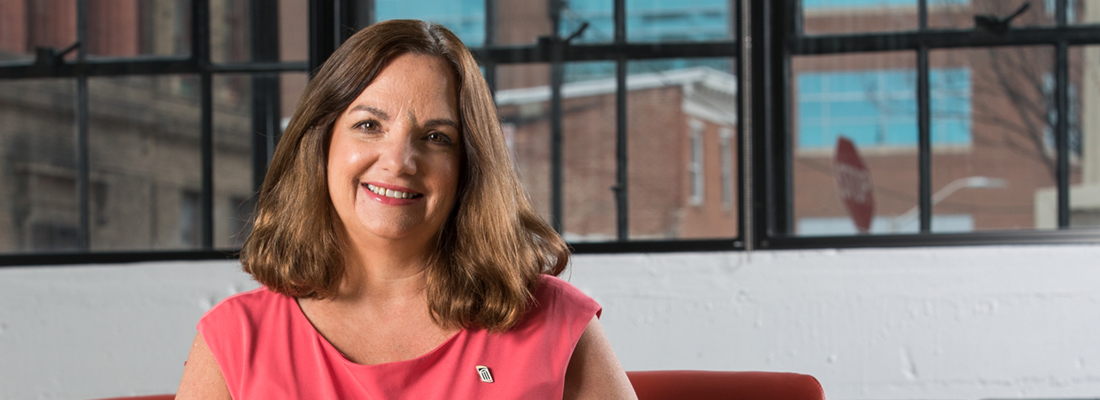Mary Jo “M.J.” Bondy, DHEd, MHS, PA-C | University of Maryland Graduate School
View Full 2017-2018 Champions of Excellence Gallery Find Out More About the Champions of Excellence Campaign
Mary Jo “M.J.” Bondy’s official title is assistant dean of academic programs at the University of Maryland Graduate School. But like most people at the University of Maryland, Baltimore (UMB), she wears more hats than her title suggests.
As an award-winning teacher, certified physician assistant (PA), PA program director, leader within the Office of Academic Innovation Distance Education, and self-proclaimed “beach girl,” Bondy has been instrumental in transforming the future of education at UMB.
When she began her role as assistant dean in 2016, she was tasked with making sure all instruction delivered online met the quality expectations of the University — the same rigorous and evidence-based best practices and curriculum delivered in the classroom should also apply to online learning at the Graduate School.
“I have this wonderful opportunity to work with some of the most talented people — leadership, faculty, instructional designers, and media specialists,” she says, “and there’s this palpable can-do attitude that allows us to take risks that are rare in higher education these days.”
A perfect example? The massive open online course (MOOC) that UMB and the University of Maryland University College (UMUC) piloted, working with EdX and the University System of Maryland, which has reached more than 1,000 learners across the globe.
“The amazing thing about the MOOC is you’re putting up graduate-level content by world-class UMB and UMUC faculty for consumption by anyone worldwide on this celebrated EdX platform,” she says. “By just doing that, we’re advancing the mission of the institution to be a beacon to the world as an environment for learning and discovery by showing our commitment to health and advancing knowledge wherever and however we can.”
The first free online course centered on global health lessons on Ebola, with input from UMB’s Center for Global Education Initiatives. The next global health course, launching in summer 2018, will focus on violence and disaster relief. People from all over the world viewed the first course — from inner city Baltimore to parts of South America and Africa, where Bondy, who was head of the Graduate School’s Master of Science in Public Health program from 2014 to 2016, says lessons learned about global health system issues and the Ebola response could be applied to the Zika outbreak and other epidemics plaguing these regions.
With access-to-care issues worldwide, Bondy hopes that expanding education — using technologies like MOOC — will not only improve quality of care delivery, but also reduce health disparities, especially in underserved populations. Throughout her career as a PA, she’s worked to do just that, helping underserved patients in urban and rural areas. Now, in her role at the Graduate School, she’s doing the same through higher education.
“I see the Graduate School reinventing itself every day, by being more entrepreneurial and getting more involved in online education,” she says. “I applaud the leadership for being open to evolving, because we know the way students learn is impacted by technology, and leadership has been instrumental and proactive in putting the resources behind that.”
As described in UMB’s Catalyst campaign to fund endowments, scholarships, research, and programs at the University, the future of UMB will be driven by Big Ideas — key strategic priorities and outcomes that leverage the unique interdisciplinary expertise of UMB’s seven schools and organizations worldwide to be catalysts of change. One of those Universitywide Big Ideas that Bondy is championing is ending the cycle of opioid addiction through interprofessional education.
Last year, she and faculty from across UMB, in partnership with the Baltimore Area Health Education Center, piloted a training program that brought together faculty and students from all seven schools for training on Narcan, a revolutionary drug that can reverse the effects of an opioid overdose. A 2015 Centers for Disease Control and Prevention study reported nearly 26,000 overdose reversals nationwide through use of the drug.
“Knowing how West Baltimore has been struck really tragically by opioid addiction — and how the death rate has increased significantly — I’m so proud that we’ve led the first initiative to bring all schools together to fight this epidemic,” Bondy says. “The Graduate School is uniquely prepared to do that because we’re the nexus where all schools come together.”
The first event in April 2017 saw faculty generously volunteering their time and working with a community health worker to train UMB students on how to recognize and assess someone for potential overdose, and how to deliver the lifesaving drug when desperately needed. It was so successful they held another training event in the fall 2017 semester and received ongoing funding from the UMB Center for Interprofessional Education for a spring training session that was held in April 2018.
It’s a shining example of how UMB leverages its resources in local neighborhoods to make a difference, to combat the opioid addiction that has a stronghold on some of Baltimore’s most vulnerable communities.
“It’s completely aligned with President Perman’s mission and vision and interprofessional education charge,” Bondy says. “At the same time, we’re giving our students a voice in how to move forward, and how UMB can extend its resources to make a real, meaningful impact on our communities.”



